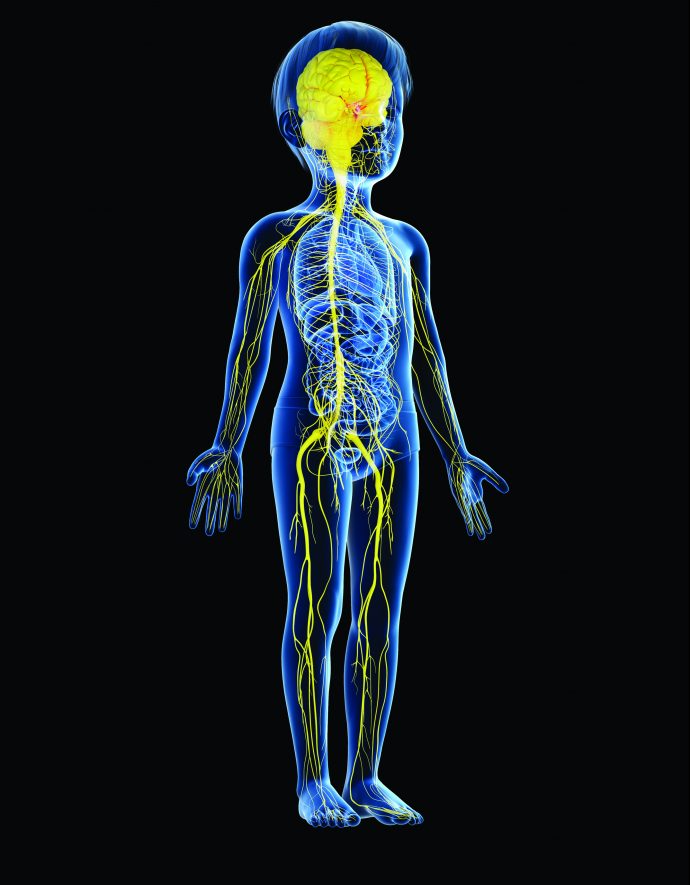Our central nervous system (CNS) is comprised of the brain (one of the most important organs in our body) and spinal cord. These play a crucial role in ensuring our body functions properly. So just how important is our CNS and what can we do to care for it, especially when it comes to children?
The most important component and ‘controller’ of the CNS is the brain. It is a complex organ that serves many key roles related to cognitive functions, thinking, learning, emotions, and it also controls autonomous actions such as breathing and heart rate.
The spinal cord serves as a central ‘highway’ or bundle of nerves that connects the brain with the rest of our body, thus allowing the two-way flow of signals to and from the brain (e.g. sensations from fingertips/toes (to elicit a reaction from the nerve endings), sweating to cool the body, etc.).
There are many factors that can adversely affect a child’s growth and development. This includes damage to the CNS as a result of physical damage (e.g. falling down a flight of stairs), certain diseases that affect the brain and/or spinal cord, and congenital disorders such as spina bifida cystica or microcephaly.
Tender care required
Our skull, spine, and meninges (the protective tissues covering the brain and spinal cord) protect the CNS from external injuries. However, they are still vulnerable to infections caused by pathogens that break through the blood or brain barrier. Thus, we must protect and care for our CNS to minimise the possibility of damage. Some factors that can cause harm include:
- Infections: Mainly caused by bacteria (sometimes virus or fungal infections), the infections can potentially cause life-threatening conditions. Compared to an adult, a child’s immune system is still immature and more susceptible to infections.
- Physical harm: Damage from physical injuries to the CNS can be divided into:
– Blunt force trauma: caused by falls or being hit by objects (e.g. baseball or car), resulting in concussion, or fractured/broken bones.
– Penetrative trauma: caused by an object that pierces the skull/body. - Poor nutrition: A healthy diet is crucial for providing the CNS (especially the brain) with sufficient nutrients for proper growth and development. Nutrient deficiencies (e.g. iron, folic acid, or vitamins) can adversely affect the brain and impair cognitive function and development.
- Dehydration: 73% of the brain structure is made of water. Severe dehydration would adversely affect the normal brain functions so always keep children well-hydrated.
- Pregnancy: This is a critical growth period for the foetus, and structural defects can occur if there is a lack of specific nutrients such as folic acid, leading to spina bifida (affecting the spinal cord) and anencephaly (affecting the brain). Certain maternal illnesses (e.g. rubella, Herpes, Zika) that occur during pregnancy can also cause microcephaly in the foetus (baby’s head is smaller than normal).
Did you know?
Both meningococcal and pneumococcal disease can cause meningitis (inflammation of the meninges), and this can cause epilepsy or affect brain functions, e.g. memory or concentration problems, or balance and coordination problems. Worse still, if the infection spreads to other parts of the body, this can cause complications such as blood infection (septicaemia) or pneumonia. These can have a devastating long-term effect to the child, even after he has recovered.
Prevention is better than cure
Many of the dangers are preventable, thus parents need to take the appropriate action. For instance, teaching kids good hygiene will help to keep infections at bay. However, this step alone is still not enough! In the case of meningococcal and pneumococcal diseases, your best bet would be to vaccinate your child.
Fortunately, pneumococcal vaccination is now included in the National Immunisation Programme (NIP). However, for those born before January 2020, parents should seriously consider vaccinating their child against pneumococcal diseases, plus getting the recommended meningococcal vaccination if they have not done so. At the same time, all adults (including the elderly) should consider getting vaccinated too, to prevent getting the disease, as well as becoming an unwitting carrier and passing it onto others.
In addition to vaccination, take all the necessary precautions to keep your child safe from physical harm or injuries. Take the time to properly baby-proof your home, always keep infants and toddlers in your sight, and make dangerous areas such as balconies inaccessible. This greatly minimises the danger of accidental falls and pulling heavy objects on themselves when they explore their surroundings.
Our CNS cannot be replaced and there are no transplant options. Damages can be severe and permanent, with lasting effects on life – physically, mentally and emotionally to the child and family. So don’t take things for granted and always keep your children safe from harm, danger and diseases.
An educational contribution by Malaysian Paediatric Association.






Comments